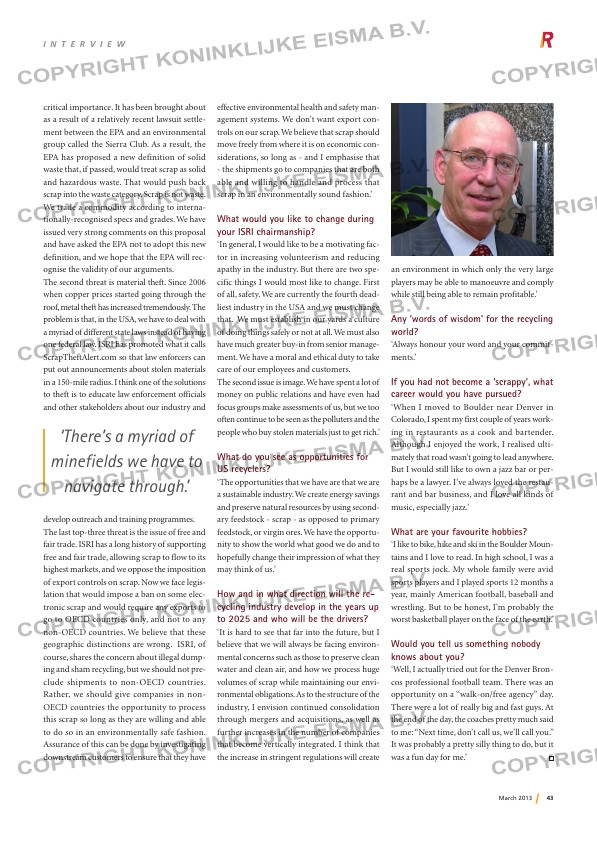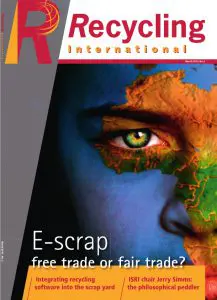Page 43 from: March 2013

43March 2013
an environment in which only the very large
players may be able to manoeuvre and comply
while still being able to remain profitable.’
Any ‘words of wisdom’ for the recycling
world?
‘Always honour your word and your commit-
ments.’
If you had not become a ‘scrappy’, what
career would you have pursued?
‘When I moved to Boulder near Denver in
Colorado, I spent my first couple of years work-
ing in restaurants as a cook and bartender.
Although I enjoyed the work, I realised ulti-
mately that road wasn’t going to lead anywhere.
But I would still like to own a jazz bar or per-
haps be a lawyer. I’ve always loved the restau-
rant and bar business, and I love all kinds of
music, especially jazz.’
What are your favourite hobbies?
‘I like to bike, hike and ski in the Boulder Moun-
tains and I love to read. In high school, I was a
real sports jock. My whole family were avid
sports players and I played sports 12 months a
year, mainly American football, baseball and
wrestling. But to be honest, I’m probably the
worst basketball player on the face of the earth.’
Would you tell us something nobody
knows about you?
‘Well, I actually tried out for the Denver Bron-
cos professional football team. There was an
opportunity on a “walk-on/free agency” day.
There were a lot of really big and fast guys. At
the end of the day, the coaches pretty much said
to me: “Next time, don’t call us, we’ll call you.”
It was probably a pretty silly thing to do, but it
was a fun day for me.’
I n t e r v I e w
critical importance. It has been brought about
as a result of a relatively recent lawsuit settle-
ment between the EPA and an environmental
group called the Sierra Club. As a result, the
EPA has proposed a new definition of solid
waste that, if passed, would treat scrap as solid
and hazardous waste. That would push back
scrap into the waste category. Scrap is not waste.
We trade a commodity according to interna-
tionally-recognised specs and grades. We have
issued very strong comments on this proposal
and have asked the EPA not to adopt this new
definition, and we hope that the EPA will rec-
ognise the validity of our arguments.
The second threat is material theft. Since 2006
when copper prices started going through the
roof, metal theft has increased tremendously. The
problem is that, in the USA, we have to deal with
a myriad of different state laws instead of having
one federal law. ISRI has promoted what it calls
ScrapTheftAlert.com so that law enforcers can
put out announcements about stolen materials
in a 150-mile radius. I think one of the solutions
to theft is to educate law enforcement officials
and other stakeholders about our industry and
develop outreach and training programmes.
The last top-three threat is the issue of free and
fair trade. ISRI has a long history of supporting
free and fair trade, allowing scrap to flow to its
highest markets, and we oppose the imposition
of export controls on scrap. Now we face legis-
lation that would impose a ban on some elec-
tronic scrap and would require any exports to
go to OECD countries only, and not to any
non-OECD countries. We believe that these
geographic distinctions are wrong. ISRI, of
course, shares the concern about illegal dump-
ing and sham recycling, but we should not pre-
clude shipments to non-OECD countries.
Rather, we should give companies in non-
OECD countries the opportunity to process
this scrap so long as they are willing and able
to do so in an environmentally safe fashion.
Assurance of this can be done by investigating
downstream customers to ensure that they have
effective environmental health and safety man-
agement systems. We don’t want export con-
trols on our scrap. We believe that scrap should
move freely from where it is on economic con-
siderations, so long as – and I emphasise that
– the shipments go to companies that are both
able and willing to handle and process that
scrap in an environmentally sound fashion.’
What would you like to change during
your ISRI chairmanship?
‘In general, I would like to be a motivating fac-
tor in increasing volunteerism and reducing
apathy in the industry. But there are two spe-
cific things I would most like to change. First
of all, safety. We are currently the fourth dead-
liest industry in the USA and we must change
that. We must establish in our yards a culture
of doing things safely or not at all. We must also
have much greater buy-in from senior manage-
ment. We have a moral and ethical duty to take
care of our employees and customers.
The second issue is image. We have spent a lot of
money on public relations and have even had
focus groups make assessments of us, but we too
often continue to be seen as the polluters and the
people who buy stolen materials just to get rich.’
What do you see as opportunities for
US recyclers?
‘The opportunities that we have are that we are
a sustainable industry. We create energy savings
and preserve natural resources by using second-
ary feedstock – scrap – as opposed to primary
feedstock, or virgin ores. We have the opportu-
nity to show the world what good we do and to
hopefully change their impression of what they
may think of us.’
How and in what direction will the re-
cycling industry develop in the years up
to 2025 and who will be the drivers?
‘It is hard to see that far into the future, but I
believe that we will always be facing environ-
mental concerns such as those to preserve clean
water and clean air, and how we process huge
volumes of scrap while maintaining our envi-
ronmental obligations. As to the structure of the
industry, I envision continued consolidation
through mergers and acquisitions, as well as
further increases in the number of companies
that become vertically integrated. I think that
the increase in stringent regulations will create
‘There’s a myriad of
minefields we have to
navigate through.’
RI_2-Interview.indd 43 06-03-13 09:26



